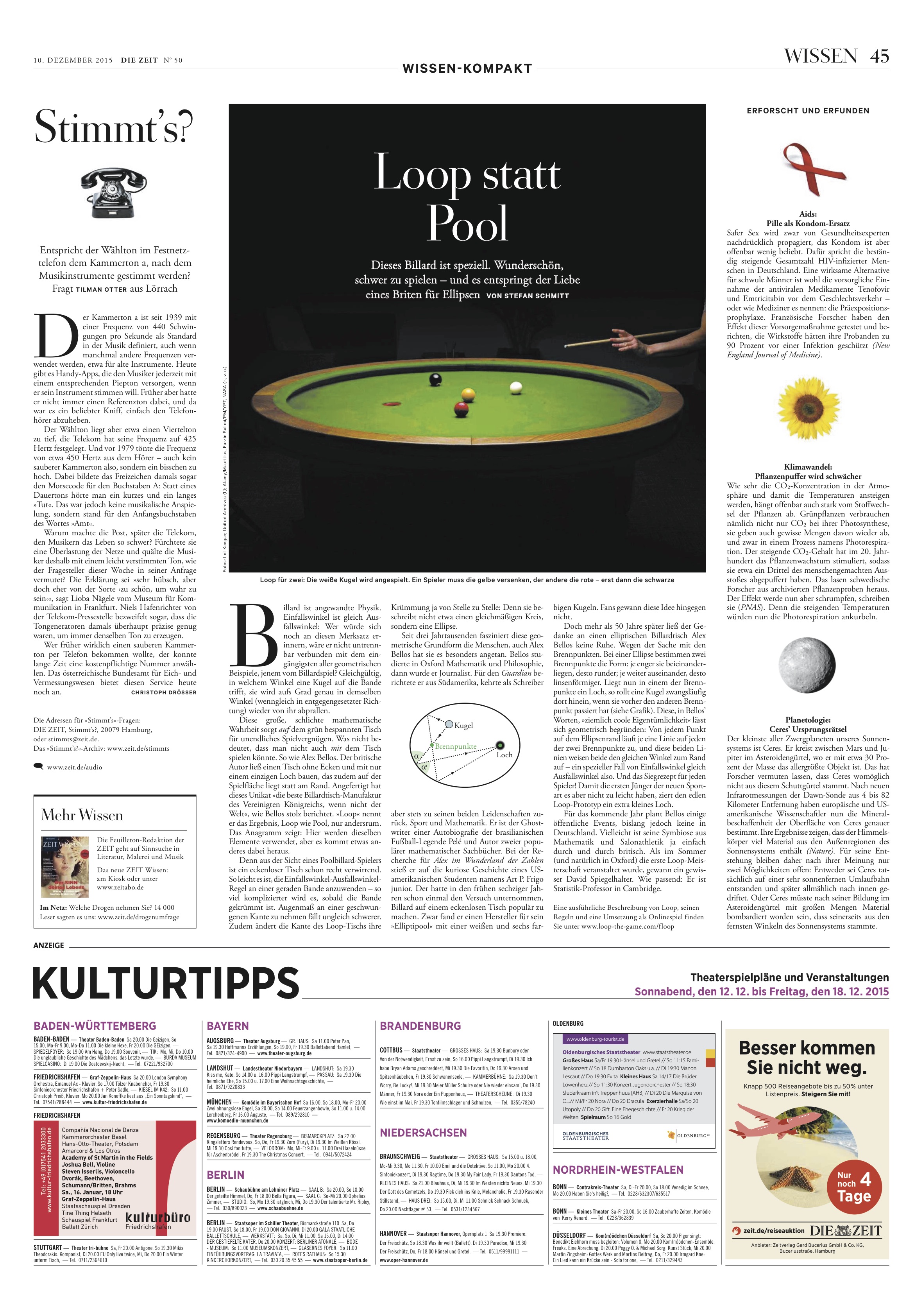This article appeared in the April 29 edition of the Evening Standard, printed below.
Why new cue sport Loop's elliptical pool table is redefining the game
Smart offices take a break from being square on oval billiards tables, says Frankie McCoy
Pool can be a challenging sport. I’ve reduced grown men to tears in the pub with my inability to pot a ball millimetres from the pocket. So I sympathise with Alex Bellos, a mathematician and journalist, when he tells me in a matter-of-fact way, “I don’t play pool.” But that hasn’t stopped him from changing the game. Bellos has invented an elliptical pool table, which he hopes will revolutionise bar sports.
His Loop table is covered in green baize — but that is where the similarity with a traditional one ends. Its shape means that any balls shot on this table (it comes with four: one red, one yellow, one white cueball and one black) go straight into the hole, every time. At least, theoretically.
It works because of ellipses. Here’s the maths bit: To draw an ellipse, use two pins with a string slung between then. Keeping the string taut with a pencil, draw around the two pins and it will mark out an ellipse. Each pin is at one of the two focuses of that particular ellipse. The relationship between the two means that in the case of an elliptical pool table a ball that passes through one focus at sufficient speed will rebound through the other one. So if there’s a hole at one focus, any ball that passes through the other should rebound straight into the hole.
Hedge fund managers are addicted — Loop is an ideal work destresser
It was while he was writing a his numeric book, Alex Through the Looking Glass, that maths fiend Bellos came up with the idea for the game. “Theoretical elliptical pool tables are used in physics and maths as a tangible means of understanding how something works,” he explains. “So I thought it would be fun to go and build one.”
That was easier said than done. The original Loop, built by the Snooker & Pool Table Company, cost more than £10,000 to build, which is why it’s housed at hedge fund Winton Capital Management in Hammersmith, which stumped up the cash for the project.
Employees there are addicted: there’s an in-house league table and regular tournaments. While Bellos teaches me to play, a queue forms of other people waiting their turn. It was a hit at the highbrow Port Eliot festival, where Bellos launched the table last year. Since then he has sold some tables to some private — presumably very wealthy — individuals and is interested in getting businesses to buy them for their employees to use in “breakout spaces”.
I’m surprised Google hasn’t put in an order — Loop is an ideal in-work leisure activity. Smaller than a regular table, it’s great for when you’ve only got a few minutes break: shoot the balls right and the fact that you’ve only got two to pot means the game could be over in seconds, although between Loop pros, tactical manoeuvres and blocking shots mean games can go on much longer.
Bellos is interested in the maths side of it: “The magic of this table is that mathematically speaking, as long as the ball goes through the black dot [at the other focus], you can hit it anywhere and it goes in. That’s the geometry of the ellipse.” But when Bellos goes to demonstrate his magic pool table, his ball grazes but misses the admittedly rather small pocket. How accurately balls pass through the focus plus friction and imperfect cushions mean it’s not a dead cert. When, later on, he does manage to pot a shot, his jubilation suggests it’s a rare occurrence. “What I thought would be the most boring game actually became something really interesting. It could be the new snooker. Why shouldn’t every start-up have one? Just by playing it you get to understand a little bit about ellipses.”
I’m not quite ready to clash cues with the pros yet. On my first shot I fail to make contact with even the cueball; on the second, the ball brushes past nowhere near the hole. But then somehow, I understand. The angles are obvious; if I just clip the red ball right there... A satisfying click, and the ball rolls into the hole. It’s immensely satisfying — and I’ve used actual maths to make it happen. If only Bellos could find a way to make darts bearable.










